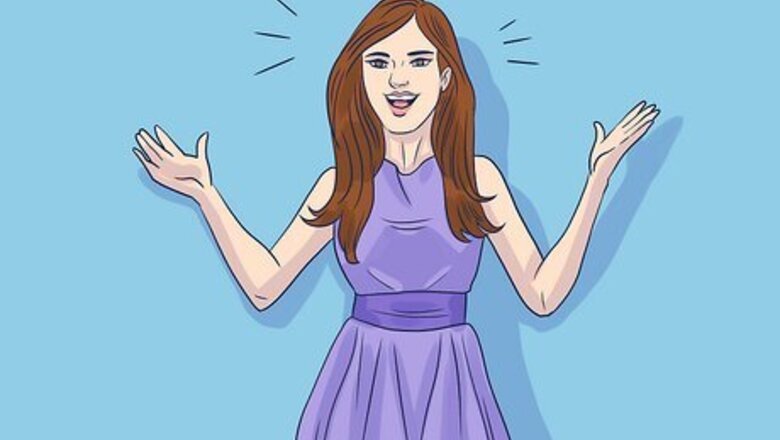
views
Dealing with Loneliness

Focus on the benefits of being single. Because you're single, you have the freedom to choose where you live and what you do without having to take anyone else's interests into consideration. You can put yourself first without worrying that you're neglecting someone else. You also have more free time to pursue life goals. Remind yourself that plenty of people in committed relationships wish they could pursue their own goals, be they personal or professional, without having to compromise with their partner.
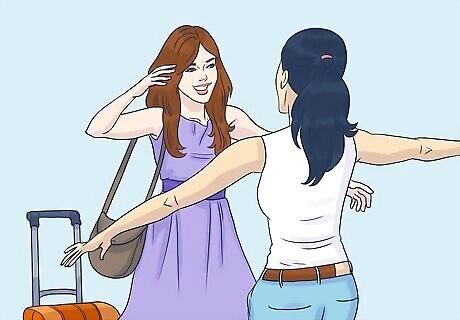
Reach out to supportive friends and family. When you're feeling lonely, you might reach out to an old friend and catch up, or ask a work buddy to share a coffee or lunch with you. Being single gives you the perfect opportunity to nourish all the other relationships in your life. Licensed clinical psychologist Chloe Carmichael recommends that you "make a list of 10 people in your life that you see erratically and could call if you were lonely without even challenging yourself to do that in the moment... [although] it would be an interesting question to ask yourself, 'Why am I not calling these people right now if I'm lonely?'" Supportive friends can also be there for you if you feel the need to vent about your feelings. It might be hard to talk about feeling lonely at first, but discussing it with a friend can help you feel better. If you have friends or family who live far away, you might plan a weekend trip to visit them—a change of scenery could be good for you as well. If a visit's not possible, you can always talk on the phone or video chat.
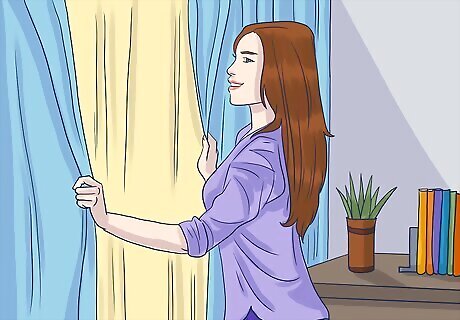
Declutter your home to encourage a more positive mindset. Taking some time to organize a cabinet or brighten up a room can do wonders for your outlook. You'll get to see the pleasant result of a little work, reminding you of how valuable and capable you are. Plus, bringing some light into a dreary environment can help you feel more connected to the outside world. Having a creative, vibrant space can be a great way to fight the loneliness blues. You might also get some flowers or plants to bring life to your home.
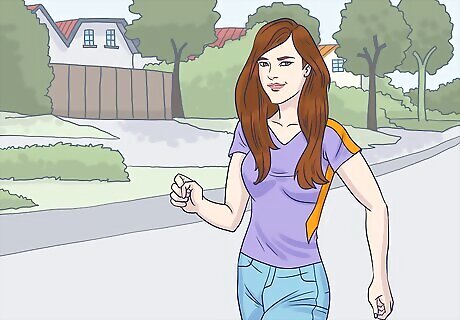
Exercise for at least 30 minutes most days. Regular exercise improves both your physical and mental health. Lean towards activities that will get you out of the house, such as going for a walk around the neighborhood or taking a group exercise class. Walking around your neighborhood or at a local park gives you the opportunity to meet some of the people who live nearby, making them potentially convenient friends. If there's a particular sport you enjoy playing, you might also see if your local area has a community league. That can be a great way to get some exercise while also making new friends.
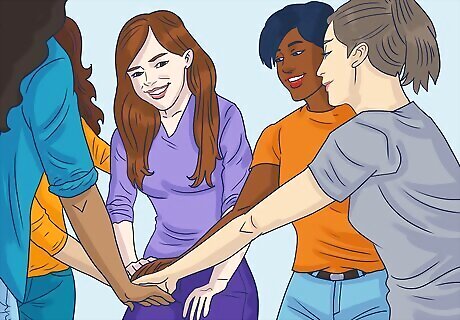
Take up a new hobby. Learning something new is a really rewarding experience that lifts your mood and improves your self-esteem. Joining a club or taking a class can also help you meet new people with similar interests. If you're interested in a more solo activity, such as gardening or crafting, you could join a club related to that activity and turn it into something social. Your local community center and library are awesome free resources that can help you find lots of different clubs, groups, and organizations in your area that are devoted to various topics or pursuits.
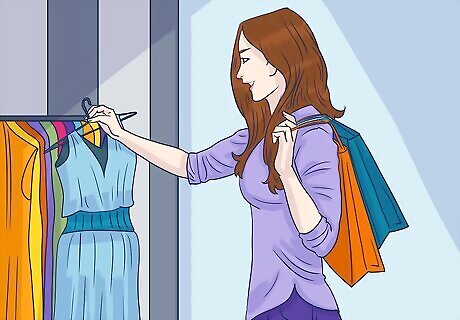
Treat yourself with rewards that require leaving the house. Going shopping for new clothes, getting a fresh haircut, or getting a massage are great ways to show love to yourself. Plus, checking out new places gives you an opportunity to chat with people you might not normally run into. If you're feeling brave, consider taking yourself to a movie, play, or concert. People tend to think of these events as things you go to with someone else, but there's no reason you can't go alone and have the time of your life. If you have the time and resources, you might take yourself on a vacation to a place you've always wanted to visit. You'll be your own best travel companion—no need to negotiate with someone else or put up with their quirks.
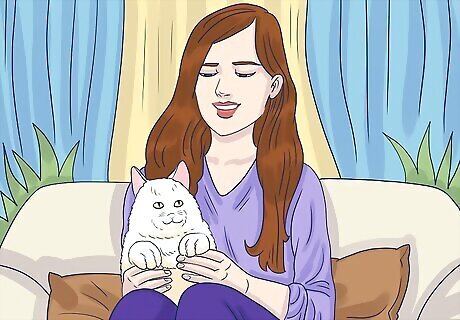
Get a new furry friend. If it makes you feel down to come home every day to an empty house, a furry companion can help. Pets offer unconditional love and help curb feelings of loneliness. As if that weren't enough, pets can even improve your overall health, such as by lowering your blood pressure. Pets also provide opportunities to be more social. For example, you could meet other dog owners if you take your dog to a nearby dog park.

Remind yourself that you're not alone. Feeling lonely from time to time is part of being human—everybody has felt lonely at some point in their life. And being in a relationship doesn't guarantee that you'll never be lonely either! Avoid idealizing relationships or thinking they're some kind of cure-all. The best way to deal with loneliness is to form connections with other people so that you feel supported and cared for.
Building Your Social Confidence
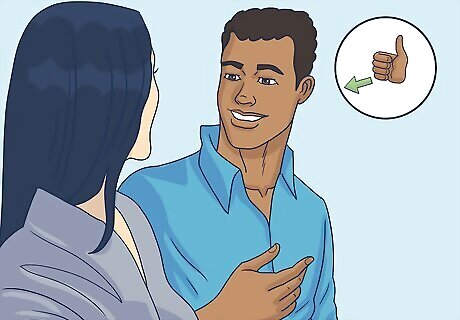
Redirect negative, critical thoughts to something more positive. A huge part of confidence is recognizing the thought patterns that give rise to insecurity and changing those thoughts into something empowering. Acknowledge the thought and counter it with a positive affirmation about yourself. For example, if you find yourself thinking, "This person thinks I'm boring," you might tell yourself, "No! I am interesting and worthy of attention." Avoid dwelling on past relationships and what you could have done better. Think of them as learning opportunities that can guide you in the future.
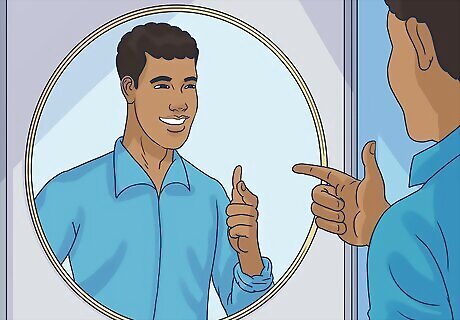
Accept your feelings and treat yourself with compassion. You're never alone in how you feel—there are many other people who've felt the same way. Allow yourself to be open and honest about your fears and vulnerabilities. It will help you bond emotionally with others. It's okay if you don't like being single or if it makes you feel lonely or frustrated sometimes. It doesn't mean that there's anything wrong with you—these are perfectly normal and understandable feelings to have. Licensed clinical psychologist Donna Novak notes that "having a practice to help you develop more mindfulness can be helpful... when you're feeling that way." Being honest about your feelings of loneliness can also help other single people see that they aren't alone in feeling that way.
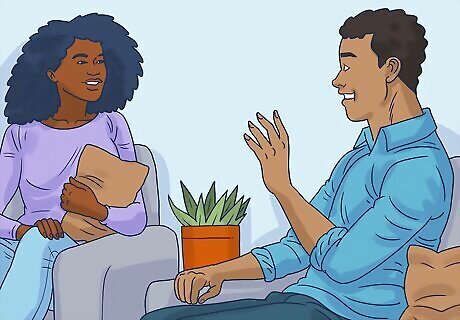
Put yourself out there to make new connections. This can feel risky and stressful at first, especially if you're not used to navigating social situations alone. But by taking baby steps, you'll start to get more comfortable in your own skin. It's not necessarily about transforming yourself into an extrovert—it's more about being more at ease with who you are and what you have to offer others. Licensed clinical psychologist Chloe Carmichael recommends that "you might want to just first ask yourself why you're lonely. Think about if there's ways that you can try to overcome that." For example, you might take a painting class at your local community center and try chatting up the person next to you before or after class. You already have a ready-made topic to discuss! Keep in mind that it's totally normal that some people you meet aren't going to vibe with you—and that's okay! You can't expect to get along with everybody. And sometimes, people are just having a bad day or feeling frustrated about something that has nothing to do with you. Licensed clinical psychologist Donna Novak recommends "reminding yourself of past efforts that you were able to connect with somebody you didn't know" to build up your confidence and reduce anxiety.
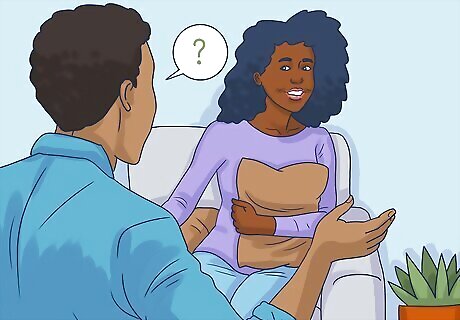
Spur conversations by asking questions. If you're nervous about talking to other people, take the spotlight off yourself and put it on them instead! When you ask open-ended questions, you give the other person the opportunity to tell you a story about themselves. As they're talking, you might also catch details that you can ask follow-up questions about. For example, you might ask them to tell you their favorite thing about the work that they do or if they've seen any good movies lately. Licensed clinical psychologist Donna Novak says, "I really would urge people to ask a question, because people tend to get really engaged with questions."
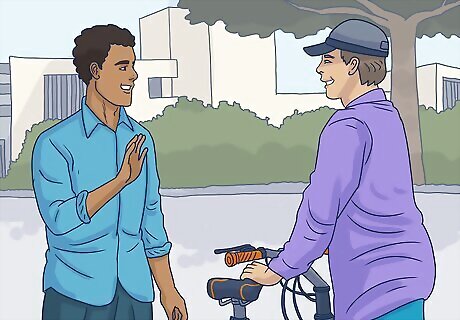
Take baby steps to increase your confidence in social situations. Challenge yourself to try new things, talk to new people, and engage in different types of interactions in different contexts. Each small step will have you feeling a little more confident about yourself and also a little less lonely because you'll feel more socially connected to the people around you. For example, you might strike up a conversation with the person next to you in line at the store, join co-workers for a drink after work, or chat briefly with your neighbor while you're walking your dog.
Meeting New People
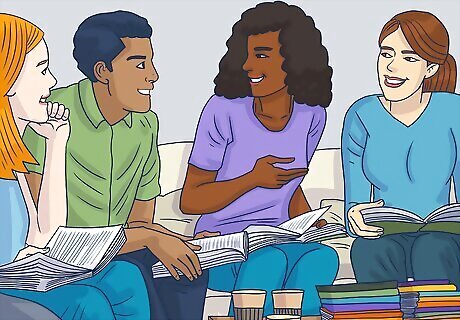
Join a new club or organization. Your local library or community center are great places to find out about different clubs and events in your area. You could also use internet resources, such as Meetup, to find local gatherings that are related to your interests. When you get involved with one of these groups, you'll find that you're already bonded to the other members by virtue of this thing that you all have in common, which will help you feel a lot less lonely. If you're religious, you might consider joining a local place of worship, or a mediation or prayer group. Licensed clinical psychologist Chloe Carmichael mentions that "just in a very simple way, you could start joining some meetup.org, that's everywhere. No matter where you live, there should be a Meetup." Licensed clinical psychologist Donna Novak seconds the idea of "thinking about coming up with some plans to meet people and connect with people. That can be looking into some groups in the area, definitely on the Meetup and things like that."
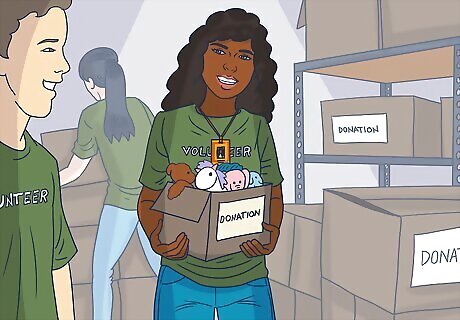
Volunteer for your favorite charitable cause. Volunteering is a great way to give back to your community while also bonding with other people who share the same passions. Dedicating a few hours a week to volunteer work is also a good way to keep yourself busy and out of the house. For example, if you love animals, you might volunteer to walk dogs for your local shelter.

Interact with an online community. There are plenty of ways to meet and interact with people online apart from dating apps. Try out playing online games with chat features, following and messaging people on social media platforms, or joining an online discussion forum. Chatting with people online is also a great way to boost your confidence if you get anxious about talking to people face-to-face! Just remember that you don't actually know the person on the other side of the screen. Practice internet safety and avoid sharing private information.
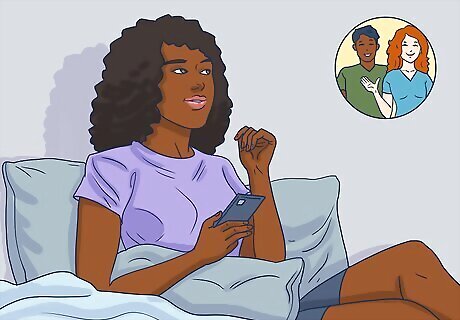
Allow connections to evolve over time. Maintain a little distance between yourself and the new people in your life. Text them occasionally and meet up with them once or twice a week to start. Have patience and you'll develop some really strong friendships (if not more) with people. Feeling lonely can make you feel desperate to make a connection, but it's better if you take things slow—whether you're talking about a platonic or a romantic relationship. Let things deepen and grow organically at their own pace rather than trying to force something before its time.
Going on Dates

Set up an online dating profile. Be honest and humble in your profile, speaking positively about your hobbies, interests, and strengths. Once you've written your profile, read it out loud to check for errors and make sure it sounds conversational and friendly before you post it. Pace yourself, perhaps only looking at a handful of profiles each time you use the app. When you match with someone, work steadily toward building a connection while at the same time not rushing things. Chat with them on the app for a bit before you agree to meet for the first time. Chatting with someone online for an extended period before meeting in person can cause you to idealize them and build up a relationship with them in your mind that might not be in sync with your chemistry in reality. Try to keep it to within a week.
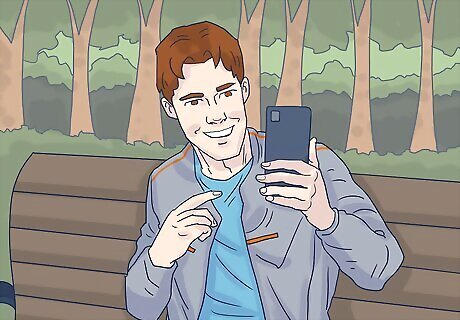
Practice flirting or chatting people up in person. Focus on simply meeting and connecting with people rather than trying to find "The One." Use flirting to let people know that you're open to the possibility of a more romantic or sexual connection. For example, you might flirt with someone cute who's in line in front of you at the grocery store. If you avoid having any expectations about these encounters, it will help take some of the pressure off and make it easier to chat people up. Let the interaction be whatever it will be without trying to push it in a certain direction.
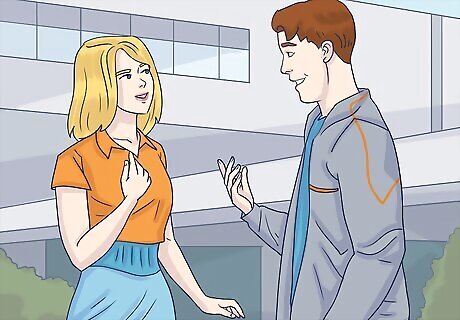
Keep your tone calm and casual when asking someone out. If you meet someone you're interested in getting to know romantically, bring it up in a casual way. You might ask them to grab a cup of coffee with you or go for a walk in the park. If things go well, ask if they'd like to see you again. It helps if you just think of it as asking a friend if they want to come hang out with you, rather than asking someone out on a date, which can carry a little more pressure. For example, if you meet someone in a bookstore who's carrying a book written by your favorite author, you might mention that and talk to them about that author's other books. Then, you could casually invite them to a related event or to have a coffee and chat about it more. You might say, "I've got to get to work now, but I'm really enjoying this conversation. Would you be interested in continuing it over coffee sometime later this week?"

Limit first dates to brief, public encounters. The best first date gives you and your date the opportunity to feel each other out without being too high-pressure. Coffee or a drink has less of the pressure or formality of a dinner date and can be cut off pretty quickly and amicably if you're not feeling the vibe. Allow the connection to build naturally without any expectations that you and this specific person are going to really hit it off, get married, and live happily ever after. Even if you don't find a romantic spark, you might still end up making a great friend. Licensed clinical psychologist Donna Novak notes that "we tend to go all the way to the end, we tend to think about... all the what ifs and we go five steps forward." She recommends "going back to the first step. Today, I'm only going to have a conversation, today, I'm only going to do this, or today, I'm only going to have a phone call... breaking things down per day per step."
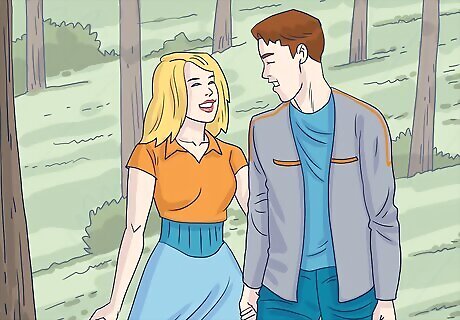
Take time to talk during the second or third dates. If the first date went well, plan a longer second date when you can get to know each other a little better. Choose something that takes a little longer but has plenty of opportunities for conversation, such as dinner or a walk around a local park. You might also consider going to a museum or even the zoo—you'll have built-in conversation starters and potential bonding moments. When you're just starting to get to know each other, avoid doing activities with a lot of other friends—keep the focus on the two of you.

Stay open to possibilities when starting a new relationship. When you hit it off with someone, it's tempting to fantasize about where the relationship will go. Enjoy each moment as it naturally unfolds instead of trying to write your relationship's script before it can ever get off the ground. Tell yourself that not every relationship necessarily has to develop into a marriage or long-term partnership for it to be valuable. Simply dating someone casually can be fun and help you get a better sense of what you need in a partner.



















Comments
0 comment